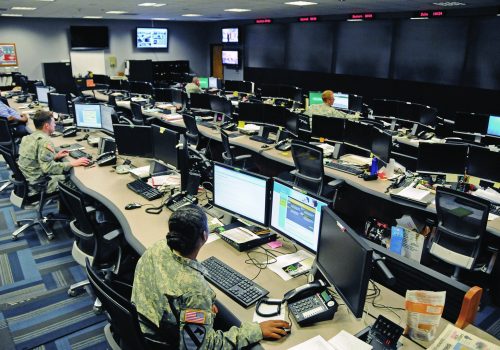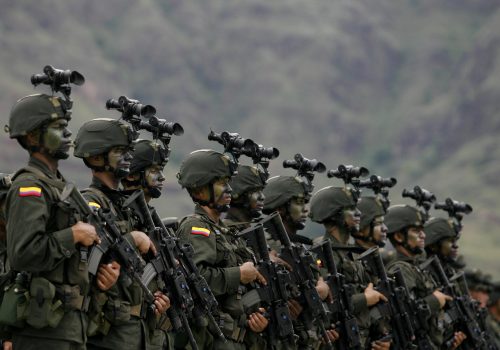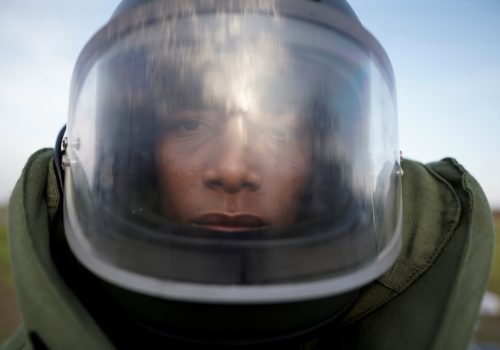Think broader to advance security
THE BICENTENNIAL OF US-COLOMBIA diplomatic relations is an opportunity to reflect on an historic and enduring relationship. Our shared history is rooted in common values, a commitment to defending democracy, protecting human rights, and promoting shared prosperity. While the relationship continues to flourish on many fronts—from trade and investment to the deployment of advanced technologies and a green economy—the security partnership is especially vital for our nations’ future.
The security partnership has personally impacted me. It brought me to the United States as a child in the 1980s, when my father participated in a military education program. Years later, while visiting NATO headquarters, I met a US colonel who I would later learn advised the Colombian military and was a friend to my father. His support and care for Colombia was a real push for Colombia´s military agenda for years to come. The positive influence the security partnership has had on my own life reflects how it has charted a brighter future for both our countries. Personal connections and friendships matter.
From a special relationship to strategic allies
Simón Bolívar was inspired by the ideals that led to the creation of the United States; a free republic as envisioned by the United States’ founding fathers was the same vision patriots had for Colombia. Both countries also share a strong commitment to multilateral and international institutions, participating in the creation of the United Nations, the Bret- ton Woods institutions, and the Organization of American States. In 1951, Colombia became the only Latin American country that responded to the UN call for troops in the Korean peninsula. Our sacrifice of close to eight hundred Colombian soldiers resulted in a stronger military-to-military relationship with the United States.
The relationship grew even closer during the Cold War, with the United States providing support to enhance Colombian military equipment, education, doctrine, and training programs on counterinsurgency. The formation of the lanceros school, modeled on the US Army Ranger School, was a highlight. Colombia participated in UN peacekeeping operations in the Suez Canal in 1956 and the Sinai Peninsula, starting in 1981. During the 1970s through the 1990s, the security relationship focused more on count- er-narcotics and law and order activities. By the 1990s, Marxist guerrillas and the United Self-Defense Forces of Colombia funded their activities through the drug business, which was rapidly growing and expanding. By the end of the twentieth century, violence was at its peak, and Colombia was close to failure.
In response to these threats, Plan Colombia, which was initially conceived by Colombia, became a US foreign policy initiative in the late 1990s to provide invaluable support to Colombia. It acknowledged that, as the largest consumer of cocaine globally, the United States shared responsibility in addressing the illicit drug trade. Conceived by Colombian President Andrés Pastrana and crafted by President William J. Clinton, binational and bipartisan support for Plan Colombia has endured for more than twenty years; it is arguably the most successful US bipartisan foreign policy in decades. As evidence, consider that Colombia reduced all violence indicators, cocaine production decreased until 2013, the Colombian economy grew faster than those of other Latin American countries, poverty was cut by more than half in less than twenty years, and the country has become the largest security exporter in the region.
With support from Colombian taxpayers, US-enhanced Colombian military and police capabilities—including mobility, intelligence, special operations, and professional standards—have strengthened the Colombian Armed Forces, which allowed it to wage a campaign of successful and sustained blows against the Revolutionary Armed Forces of Colombia (FARC), the country’s largest guerilla group. President Álvaro Uribe’s leadership on security and policy also contributed decisively to the campaign’s success. The security policy of the first five years of the Santos administration further weakened the FARC. These efforts allowed the Colombian government to negotiate peace from a position of strength.
Where are we today?
Colombia faces a complex scenario and four main challenges that could imply a downturn after years of advancement. First, the 2016 Havana Agreements have not brought peace as envisioned. While they have resulted in significant FARC demobilization and disarmament and pro- vided a development program for marginal areas, the agreements also led to renewed unrest and political division. They have implied impunity for war crimes, higher benefits for perpetrators than victims, the weakening of a successful security strategy, and a national consensus for security.
The worst development has been the increase of cocaine and illicit mining enterprises, which illegal groups have diligently exploited. This has created renewed risks for stability and territorial control, contributing to human rights violations, crimes against social leaders, political corruption, and the destruction of the tropical forests and contamination of rivers. The strengthening of the National Liberation Army (ELN), FARC surrogates and dissidents, and other criminal actors have kept real peace out of reach for Colombians.
Second, as in all countries, the COVID-19 pandemic has had steep economic and social consequences in addition to the loss of lives. Despite the Colombian government’s well-regarded performance in enhancing the healthcare system’s response capabilities and an accelerated vaccination process, dramatic unemployment exacerbated historical inequality and poverty, contributing to societal instability, potentially threatening security.
Third, the Nicolás Maduro regime in Venezuela and Daniel Ortega’s regime in Nicaragua are sources of human rights violations, threats to freedom and democracy, and instability for Latin America and the Caribbean. In Venezuela, poor economic management has created the greatest ever refugee and migration crisis in the Western Hemisphere, with nearly two mil- lion Venezuelans already living in Colombia.
In addition, Venezuela is a safe haven for terrorist groups that plan and operate against Colombia and US interests, including a June 2021 attempt against President Iván Duque’s life. This safe heaven provides a favorable business environment for criminals, allowing them to smuggle drugs to the United States and other countries, and permitting the illegal mining of gold and other minerals in Colombia and Venezuela. Venezuela and Nicaragua have become footholds of aggressive extra-regional powers like Russia, allowing for foreign military presence and intelligence capabilities in their territories.
Fourth, global issues have worsened or emerged in recent years, including cyber threats, disinformation, climate change, pandemics, and war. These are poised to create a more unstable environment for democratic institutions and societies. We must not underestimate the risk of intervention and biased results in democratic elections. Undermining a country’s elections is, at its core, a grievous assault on the sovereignty of any nation and one with dire security consequences.
What comes next?
A stronger Colombia can spur democracy and freedom in the Western Hemisphere, while a weaker one opens the door to regional security threats and instability. To ensure Colombia does not fall or fail, and remains an indispensable security partner to the United States, the US-Colombia partnership should focus on the following areas of cooperation:
- Reconciliation and justice. Consolidating peace and stability in Colombia requires national reconciliation and providing development and market opportunities for the country’s most isolated areas. This would entail a long-term plan that includes rebalancing the current peace agreement framework with a higher focus on victims. Modernization of our justice system is also necessary and will con- tribute to enhanced state credibility in a country with high levels of impunity.
- Economic and social prosperity. The bilateral agenda should focus on reducing inequality, promoting employment and entrepreneur- ship opportunities, and defeating extreme poverty. Economic and social prosperity is the best tool to undermine populism, authoritarianism, and the illicit economies that threaten our shared security.
- Education, development, and technology. Although not traditionally associated with enhancing the security paradigm, new and expanded efforts focused on education, export promotion, energy development, and digital infrastructure would contribute to countering today’s security challenges. A joint program to dramatically increase student exchanges and higher-quality education for Colombians, especially in the digital and programming fields and English-language instruction, would contribute to a more skilled and competitive labor force. Expanding and enabling faster access of Colombian agro-industrial products to US markets is crucial to unleash Colombia’s potential as a major food and input producer. Mining development as part of the supply chain for new clean energy technologies and semiconductors in the digital realm presents opportunities for both countries. Investment in infrastructure and 5G and 6G connectivity is essential for Colombia’s competitiveness and attracting industries seeking nearshoring options.
- A “cancel culture” for illegal drugs. An unavoidable subject is the need to develop a strategy to end the international illegal drug trade permanently. Colombia must continue to fight criminal organizations that profit from cocaine. Given its shared responsibility, the United States should continue to support Colombia with proven efforts against narcotrafficking. We are hopeful our US partners will join us in exploring new techniques and data analytics to make progress on eradication, alternative crop cultivation, and countering money laundering. Beyond that, the demand for cocaine should be addressed with different approaches, including new technologies to undermine cultivation. Consumption is the real problem and treating it as a public health concern is insufficient. We need to create a “cancel culture” around the use of cocaine based on the destruction it causes to lives and the environment while funding crime and rogue regimes.
- Even stronger security ties. The potential to expand the US-Colombia security partnership is exponential. The years of strong military-to-military operational coordination and the framework for designation as a Major non-NATO Ally, as President Joseph R. Biden recently stated his intent to do,1Statement by Joseph R. Biden of the United States and President Iván Duque Márquez of the Republic of Colombia, US-Colombia Bicentennial Partnership, White House, March 10, 2022, https://www.whitehouse.gov/briefing-room/statements-releases/2022/03/10/joint- statement-by-president-joseph-r-biden-jr-of-the-united-states-and-president-ivan-duque- marquez-of-the-republic-of-colombia-u-s-colombia-bicentennial-partnership/. present an opportunity to deepen ties in doctrine, interoperability, and training. Cooperation in intelligence, cyber technology, and equipment for conventional military operations can transform Colombia’s traditional counterinsurgency capabilities into a broader spectrum of military operations. Multiple missions could be developed for humanitarian assistance, natural disaster relief, and security and stabilization operations. Finally, the opportunity for advanced technology sharing, pre-positioned stockpiles, lend and lease programs, and preferred status for excess defense articles from the United States should boost Colombia’s contribution to regional and global peace and stability.
In sum, the US-Colombia relationship has a bright future. One of its greatest strengths is its people-to-people connections. Colombian Americans are making contributions everywhere: academia, politics, business, military, science, sports and communities across the United States. In a bilateral meeting on March 10, 2022, with President Duque, President Biden reinforced the strength of our special relationship, stating: “Colombia is the lynchpin, in my view, to the whole hemisphere—north and south.… The US-Colombia relationship is the foundation … of regional security and prosperity, and it’s only going to grow more important in the years ahead.” During that meeting, President Duque, remarking on President Biden’s stated intent to designate Colombia a strategic Major non-NATO Ally, said that “we are taking the bilateral relationship to the highest peak ever.”2Ibid.
* * *
Amb. Juan Carlos Pinzón has served as Colombia’s ambassador to the United States since 2021. He was the president of Probogotá between 2018-2021 and Colombia’s ambassador to the United States between 2015-2017. During his first ambassadorship, Pinzón established the US-Colombia Business Council and contributed to Atlantic Council work on the US-Colombia relation- ship. Previously, Pinzón was Colombia’s minister of defense from 2011– 2015. He was a presidential candidate in 2018.
Related Allies essays
A roadmap for a new type of engagement
This moment opens the door for a reimagined US partnership with Colombia based on a shared vision for a more prosperous, inclusive, and sustainable future.
Related program

The Adrienne Arsht Latin America Center broadens understanding of regional transformations and delivers constructive, results-oriented solutions to inform how the public and private sectors can advance hemispheric prosperity.
Image: A child holds a national flag as people gather for the closing campaign rally of Colombian left-wing presidential candidate Gustavo Petro of the Historic Pact, ahead of the first round of the presidential elections, in Bogota, Colombia May 22, 2022. REUTERS/Luisa Gonzalez



